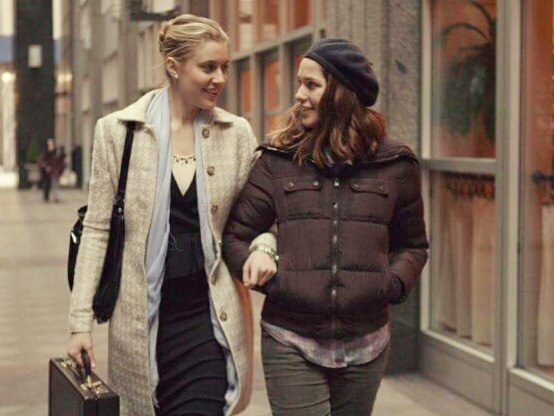Home Is Where the Drama Is

One of the weirder trends in today’s art is the rise of a certain kind of comedy: cynical and even scathing on the surface, but in the end, staunchly moral. These comedies push forgiveness, humility, and love as self-gift; the great enemies are personal ambition, unwillingness to embrace adult responsibility, and concern for one’s own self-image. (The lesser enemy is positive self-talk, which all these comedies go out of their way to satirize.) It’s a sort of comedic burned marshmallow, with an acrid outside and sweet gooey inside.
This week I’ve watched an indie Noah Baumbach/Greta Gerwig flick about women’s friendship and ambition, and a coarse cartoon about an alcoholic has-been Hollywood horse-person, and both of these otherwise utterly different comedies fit into the acrid/gooey genre. Which I’m not knocking–I mean, I wrote one of these things, apparently I’m on trend. You’ll get more on “BoJack Horseman” soon in another piece, but for now, let me tell you about “Mistress America.”
Lola Kirke plays Tracy, a college freshman in that crucial pre-Thanksgiving moment when you have no idea what your adult identity will be. In the cafeteria she picks up a cupcake: Am I a cupcake person? She puts it down. Picks up a cruller.
Tracy calls her mom to lament that she hasn’t made any friends, and her mom urges her to call Brooke, Tracy’s soon-to-be stepsister. Tracy’s mom will marry Brooke’s dad over Thanksgiving (this holiday slowly grows in significance throughout the movie, in a way I found pretty touching) but Tracy and Brooke have never met. In desperation, Tracy makes the call–and Greta Gerwig careens into her life.
Gerwig’s Brooke starts out insufferable, enraptured by her own melodrama. She’s a jack of no trades and master of fewer; she claims she will soon be a restaurateur. She says things like, “That’s cool about the frozen-yogurt machine. Everyone I love dies,” and, “I’m good at that, curating my own employment,” and, “My beau, Stavros….” She makes unfunny jokes (there are a lot of lines in this movie that are joke-shaped more than they’re actual jokes) and hands out terrible life advice, and Tracy is in love.
There are echoes of some of Baumbach’s earlier movies. Like “Kicking and Screaming,” this movie is about the undergraduate hunger for guidance, for a role model, a persona–and the way undergraduates’ lack of wisdom means they can’t even choose the right guides. And “Mistress America” shares with “Frances Ha” not only the glorious Gerwig but the focus on women’s friendship. Friendship is life-defining, the stage on which the great dramas of adoration, betrayal, and (maybe) amends are played out.
There are a lot of great lines and moments here. The speech about want (“You can’t really know what it’s like to want things until you’re at least 30″); the white-knuckled fury of the line, “I’m committed to being a happier person.” Occasionally the film’s moral seriousness comes too far out into the open: “I would [do a sordid deed] too,” Brooke says, “but it wouldn’t be my character, it would just be something I did,” to which Tracy of course responds, “When do those become the same thing?” But I loved Kirke and Gerwig’s megadramatic line readings. Everything they do is underlined.
“Mistress America” lacks “Frances Ha”‘s luminous consistency, its exhilaration. But its themes are more complex and its characters rawer. “Mistress America”‘s first 15 hminutes or so are a tough watch, until you realize that the movie knows just how self-obsessed and Potemkin both these women are, and you settle in to watch the skies for the incoming comeuppance.
And then you start to love these awful women, too. They have one of those relationships I’ll never tire of watching, where both people are thinking, The best thing about me is you. Brooke aggressively hooking her arm into Tracy’s arm; Brooke telling Tracy, “You make me feel really smart”; Tracy gazing at Brooke in open adoration. Tracy pilfering a souvenir from Brooke’s apartment.
Tracy steals a lot of knickknacks. The movie’s two odd recurring themes are home and theft. Home is evoked by the Thanksgiving setting, of course, and in Brooke’s pitch for her restaurant: She says, with ferocious intensity, “I keep the hearth.” (And then, with her autodidact’s uncertainty: “…Is that a word?”) The movie is haunted by these women’s longing for a place where they feel at home. Coming home to find the locks changed is the great unspoken fear–the promise of home and family dangled and then snatched away.
And although we get to revisit a lot of old sins here–the second half of the film is just a welter of comeuppances–many of the old hurts revolve around theft and assertions of a moral right of ownership. Brooke’s still furious about an ex-friend who stole her idea for t-shirts with edgy flower logos. Tracy “steals” Brooke’s life for the short story she’s working on, in which Brooke appears as a charismatic failure. There’s a lot of litigation here, trying to sort out who owned what and who owes what to whom.
Until suddenly there isn’t. Toward the end Tracy says, about Brooke’s purloined pets, “The cats went from stolen to given because you changed your mind.” Brooke immediately snaps back, “Don’t put that in a story,” but it is not false. If you are trapped in the wreckage of your self-image, one way out is to waive your rights. Maybe it doesn’t matter what you’re owed.
Eve Tushnet is a TAC contributing editor, blogs at Patheos.com, and is the author of Gay and Catholic: Accepting My Sexuality, Finding Community, Living My Faith, as well as the author of the newly released novel Amends, a satire set during the filming of a reality show about alcohol rehab.